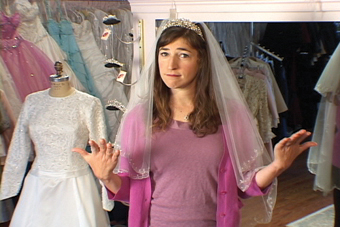‘Women Unchained’
Permanent link All Posts
Actress Mayim Bialik, narrator of "Women Unchained."
Women's rights issues such as abortion and birth control are prevalent in the news these days, but there's one issue in the Jewish community that's not getting nearly as much attention.
Beverly Siegel—a producer of award-winning documentaries for commercial and public television, corporate clients, and Jewish organizations—is working to change that.
Women Unchained—produced by native Chicagoans Siegel and Leta Lenik—is an important new documentary about the experiences of modern-day agunot, women whose husbands refuse to grant them a Jewish divorce. The Chicago premiere of Women Unchained will take place Sunday, March 11 at Spertus. The film is narrated by actress Mayim Bialik (of Blossom and The Big Bang Theory) and features an original score by Grammy-winning guitarist C Lanzbom, lead singer of Soul Farm.
Women Unchained follows six women in their quest to receive a get, or Jewish divorce, from their husbands. The film interviews leading women's rights advocates, rabbis, and experts in Jewish law. It explores the state of women's rights in Judaism and details "get-o-nomics," outlandish extortion schemes levied against some women.
"Get"-o-nomics
According to Siegel, in ancient times, an "agunah" was typically a woman whose husband was lost at battle or at sea, with no proof of his death. In the modern era, an agunah is generally a woman whose husband's whereabouts are known, but, "holding out for money or vengeance, he just refuses to give her a 'get.'"
"When I would tell people what I was working on, I was frequently struck by how many women would respond, 'my aunt had that problem,' or 'my cousin's friend had that problem,' she said. "Most people knew someone. At first it was uncanny; then it got scary."
A recent study revealed that there have been 460 women identified as agunot in America in the last five years, but Siegel said this number is vastly understated, since it does not include women who "paid the price" for a get, or got help from women's organizations who did not participate in the study.
"Get" the word out
The issue was brought to Siegel's attention when her friends, Darryle and Michael Gillman of Lincolnwood, struggled to help their daughter get out of a marriage.
"It took my friends a lot of advocacy and work and pain, and ultimately a lot of money, and they finally got a get for their daughter." So they came to her, hoping to raise awareness of the problem of get refusal.
A year later, when Siegel decided to move forward with the project, she, Darryle Gillman and other women in the modern Orthodox community founded a not-for-profit organization, "The Agunah Project, Inc." to raise funds. Women Unchained was funded by contributions from individuals in Chicago, Florida, and New York, as well as by a grant from the Jewish Women's Foundation of Metropolitan Chicago, an independent program of the Jewish Federation of Metropolitan Chicago.
Meanwhile, Lenik, who lives in New York, had a friend going through a similar situation, raising eight children on her own. They also discovered that two filmmakers, including then-Evanston resident Jacky Comforty, had started documentary projects on this subject but then quit, and Siegel and Lenik were able to incorporate their work into the film as well.
"Get" the facts
While many think this is an issue that only affects the Orthodox community, Siegel said, in fact, if a child of a woman who does not have a proper get decides to become more observant or chooses to move to Israel, it could complicate things for that child when he or she chooses to get married. "It's a women's-rights issue but it's not as narrowly confined to just the Orthodox community as you may think," she said. "It's something that all Jews really need to understand and know about."
While the goal of the project was to raise awareness about this issue, it was also to advocate for solutions. One solution that Siegel says has great promise is for couples to sign pre-nuptial agreements and for rabbis in the Orthodox community to refuse to perform marriages without them. "There a lot of work to be done," said Siegel.
Women Unchained, which premiered in March 2011 as the opening film of the Women and Religion Film Festival in Jerusalem, will be shown at Spertus: Chicago's Center for Learning and Culture, Sunday, March 11 followed by a panel discussion.
The panel will led by Emily Soloff, associate director for Interreligious and Intergroup Relations for the American Jewish Committee. In addition to Siegel, the panel will include eminent authority on halakha (Jewish law) and av beis din (head of the rabbinical court) of both the Beth Din of America and the Chicago Rabbinical Council, Rabbi Gedalia Dov Schwartz, and international women's rights lawyer, Sharon Shenhav, both of whom are interviewed in the film.
This program is the Norman Asher Memorial Lecture and the Alex and Klara Tulsky Symposium for 2012. Addressing pressing challenges facing the American Jewish community, it reflects the vision and communal interests of the donors of these long-standing endowed Spertus programs. Tickets for the screening and panel discussion are $18 ($8 for students) and can be purchased online at spertus.edu or by phone at (312) 322-1773. For more information, visit spertus.edu.
"Women Unchained" is distributed by the National Center for Jewish Film. For further information about the film or to arrange a screening, contact www.jewishfilm.org or call (781) 736 8600.



.jpg)



